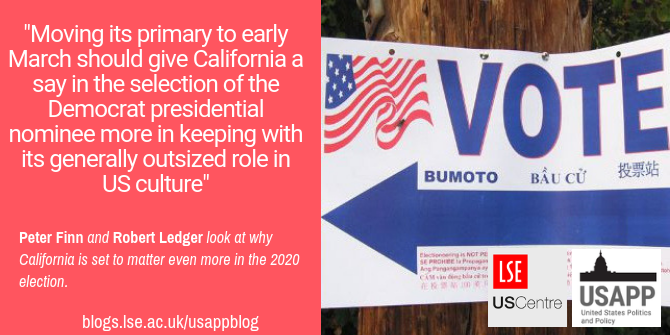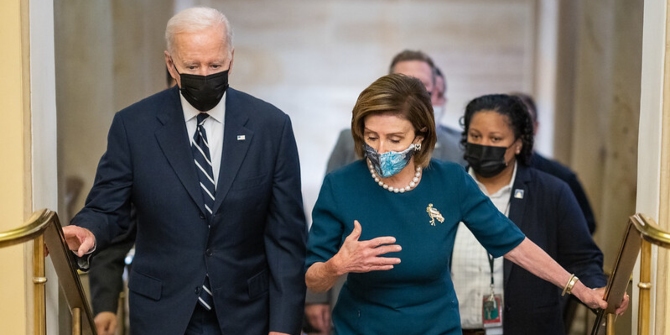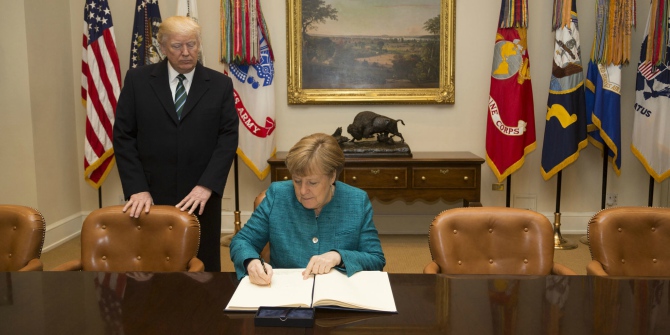
 The Golden State is the most populated in the US, has the largest GDP, and importantly, is likely to have the most primary delegates in the 2020 Democratic nomination contest. Peter Finn and Robert Ledger write that by moving its presidential primary from June to March, the Democratic-dominated state is now poised to play a significant role in determining the nominee; a role which could benefit California candidates like Kamala Harris.
The Golden State is the most populated in the US, has the largest GDP, and importantly, is likely to have the most primary delegates in the 2020 Democratic nomination contest. Peter Finn and Robert Ledger write that by moving its presidential primary from June to March, the Democratic-dominated state is now poised to play a significant role in determining the nominee; a role which could benefit California candidates like Kamala Harris.
- This article is part of our Primary Primers series curated by Rob Ledger (Frankfurt Goethe University) and Peter Finn (Kingston University). Ahead of the 2020 election, this series explores key themes, ideas, concepts, procedures and events that shape, affect and define the US presidential primary process. If you are interested in contributing to the series contact Rob Ledger (ledger@em.uni-frankfurt.de) or Peter Finn (finn@kingston.ac.uk).
So why does California Matter?
In a word, size. It has the largest population of any US state, the biggest economy, the largest amount of Electoral College votes and a huge cultural impact. As the saying goes, ‘as goes California, so goes the nation’. Indeed, Californian politicians have long played crucial roles in American life: both power brokers (think current Senior Senator Dianne Feinstein) and the empowered (President Ronald Reagan)–even Villain (think fallen President Richard Nixon) and Terminator –cum-politician (remember Governor Schwarzenegger?)–while the state’s junior Senator (Kamala Harris) is currently seeking to be the first female president and would be the first of Indian descent. There is also an upstart bid from Eric Swalwell, the Democratic Representative of the state’s 15th Congressional District.
Democratic Dominance
The Democrats dominate Californian politics. As of May 2019, both Californian Senators are Democrats (Feinstein, Harris), there is a Democratic Governor (Gavin Newsom), the party holds mayorships of key cities (think Eric Garcetti, LA), super-majorities in both houses of the California State Legislature, whilst the majority of Californian House of Representatives members from the state are Democrats. This dominance was reflected in the states 2016 Presidential voting, which saw former US Secretary of State Hillary Clinton gain over 61 percent of the vote.
California was not always a shoe-in for Democrats, even voting Republican in Presidential elections as a matter of course until Bill Clinton’s 1992 victory. Reflecting the country at large, the heavily-populated coastal areas are long-standing Democratic strongholds whereas the more rural interior was, and is, solidly Republican. In some respects California even had its own proto-Trumpian populist in Pete Wilson, the governor who signed into law the notorious anti-immigrant Proposition 187, in 1994. A sign of how this has changed, however, is in Orange County. Usually reliably Republican, four of this affluent region’s House seats were flipped by the Democrats in the 2018 midterms. A history of progressive activism has recently manifested itself in a raft of liberal legislation: California has been a leader in legislating against carbon emissions and is one of the only US states to implement a cap and trade scheme. In other moves reflecting its diversity, the state legalised same sex marriage in 2015, marijuana in 2018 and has also attempted prison reform.
Pushing back against Trump
The state is viewed as one of the central nodes of an, admittedly all encompassing and ill-defined, anti-Trump ‘resistance’. Apart from its liberal legal changes and challenges, metropolitan areas such as (although not solely) San Francisco and Los Angeles are known as ‘sanctuary cities’, where local law enforcement effectively refuses to implement nationwide rules hostile to immigrants.

“2016-06-07 i voted” by Robert Couse-Baker is licensed under CC BY 2.0
So ingrained is hostility to Trump that a bill is currently moving through the state political system that could bar candidates in presidential primaries from making it on to the ballot unless they release their tax returns, something Trump has not done. It mirrors similar bills passed in other states, with those behind it open about its purpose as a vehicle for holding the President to account. Given Trump is all but certain to be the 2020 Republican nominee, such legislation is (in its applicability to 2020 at least) mainly symbolic. But it does illuminate the depth of ill feeling towards the current administration in the State Capital of Sacramento and beyond.
Primarily Primary Impact
In 2016, Californian primaries took place on June 7th and were won relatively easily by Clinton. However, by that point the party establishment was weighing in to ensure Clinton won at the expense of Senator Bernie Sanders (something documented by leaked emails that caused a fractious Democratic Convention). Whether the results would have been affected if the primary had taken place before the party establishment applied pressure so heavily for Clinton is conjecture. Regardless, the late placement of the California primary in 2016 certainly reduced the state’s overall ability to affect the race.
In 2020, however, the Californian primary has been moved forward to so-called Super Tuesday (named because of the large number of states in play and party delegates available) on March 3rd, a full 3 months (and, depending on how you do the math, at least 30 States) earlier. Given a significant number of candidates are still likely to be involved in the battle for the Democratic nomination at that point, anyone doing well in the Golden State will likely get a bump in momentum.
A Route to the White House for Harris?
Where Harris’s Californian stature might be of benefit is during the primary season. If she is able to benefit from her standing in the state and win convincingly in California, that could bolster her campaign. FiveThirtyEight recently talked up Harris’s chances if she performed respectably in Iowa and New Hampshire, followed by a success in California. Making such an outcome more likely is the fact Harris has gained endorsements from influential Californian figures including Newsom, Representative Barbara Lee of California’s 13th Congressional District and Dolores Huerta, a key civil and labour rights figure. In fact, this trifecta is made up of the co-chairs for the Californian wing of her campaign. Similarly, mayors of six Californian cities, including San Francisco and San Jose, collectively endorsed Harris in a March 2019 letter.
On another note, as long-term shrewd observers of Californian politics John Myers and Melanie Mason of the LA Times recently observed, California is an exceedingly expensive and complex state in which to campaign. In this regard, it is likely that Harris, and to a lesser extent Swalwell, will benefit from prior name recognition without having to expend precious resources across the state’s many media markets.
Given eight other states also vote on Super Tuesday, Harris could be well placed if she has a strong Californian showing and does well elsewhere. That said, if she does not win convincingly in California and stumbles in other early states, her campaign may well flatline. If they occur, poor primary showings by Harris may well relate to critiques from the left relating to her time as a prosecutor in California.
There is much talk that the role played by California today will shift eastwards, with Texas projected to continue to grow ever more populous (and becoming ever more left, well more likely centrist, leaning) as mid-century approaches. Indeed, analysts tentatively talk of a Democratic route to the White House through the ‘Sun Belt’ (Texas, New Mexico, Arizona, Nevada and other contested states). But, even if the future does belong to the Lone Star State, the present very much belongs to California.
Though the state’s Electoral College votes are unlikely to be in play for the Republicans any time soon, moving its primary to early March should give the state a say in the selection of the Democratic presidential nominee more in keeping with its generally outsized role in US culture.
Please read our comments policy before commenting.
Note: This article gives the views of the author, and not the position of USApp– American Politics and Policy, nor of the London School of Economics.
Shortened URL for this post: http://bit.ly/2VIF41q
About the authors
 Peter Finn – Kingston University
Peter Finn – Kingston University
Dr Peter Finn is a multi-award-winning lecturer in Politics at Kingston University. His research is focused on conceptualising the ways that the US and the UK attempt to embed impunity for violations of international law into their national security operations. He is also interested in US politics more generally, with a particular focus on presidential power. He has, among other places, been featured in The Guardian, The Conversation, Open Democracy and Critical Studies on Terrorism.
 Robert Ledger – Schiller University
Robert Ledger – Schiller University
Robert Ledger has a PhD in political science from Queen Mary University of London. He has worked for the European Stability Initiative, a think-tank in Brussels, lectured at several universities in London and currently lives in Frankfurt am Main. He is a Visiting Researcher (Gastwissenshaftler) in the History Seminar at Goethe University and also teaches at Schiller University Heidelberg and the Frankfurt School of Finance & Management. He is the author of Neoliberal Thought and Thatcherism: ‘A Transition From Here to There?’






